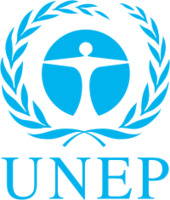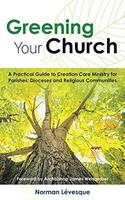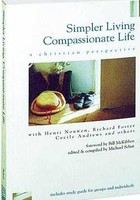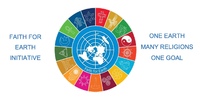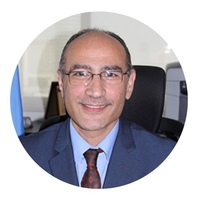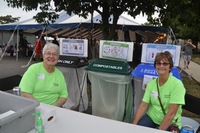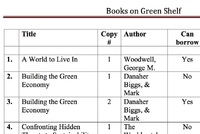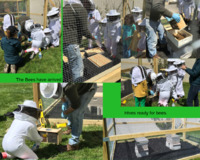Search
143 items
-
Coronavirus, Faith Leaders, and Sustainable Development
An event organized by the United Nations Environment Progamme and the Swedish International Development Cooperation Agency led a digital conference to discuss innovation to combat the environmental crisis in light of the COVID-19. The Faith for Earth Initiative calls for interfaith collaboration to combat environment problems. In the midst of a global crisis, the UN encourages this time to be used for innovation and educational progression. This quote from Iyad Abumoghi summarizes the mission:
“'The coronavirus pandemic is focusing hearts and minds, says the director of Faith for Earth, Iyad Abumoghli. “Faith for Earth is mobilizing youth, the leaders of faith-based organizations, as well as scientists and theologians to work together for innovative change to speed up sustainable development.'” -
Zero Net Energy Grants
The Mennonite Creation Care Network published information on how a Mennonite Church congregation can qualify and get approved for a grant from the Pam De Young Net Zero Energy Fund. The grant would allow congregations to install solar panels, car charging stations, or other sustainable improvements. Any Mennonite Church USA congregations willing to become more sustainable are eligible for the grant. -
Greening Your Church
"A Practical Guide to Creation Care Ministry for Parishes, Dioceses and Religious Communities," as this book's subtitle reads, author Norman Lévesque identifies and outlines strategies to creating environmentally friendly congregations. In 104 pages, learn about the theology of creation care ministry and how to green-ify your community to reduce impacts on God's creation. ISBN: 9782896466368 -
Simpler Living, Compassionate Life
Simpler Living, Compassionate Life features essays by Cecile Andrews, Henri Nouwen, Frederick Buechner, and many more authors. This collection touches on a variety of topics surrounding humanity’s relationship to our earthly home. In addition to the essays, the book includes 70 pages of additional material to help guide communities as they naviagate this book, making it a wonderful choice for book groups. -
Engaged Organizations: Lakeside Chautauqua
Lakeside Chautauqua is a community in Ottawa County, Ohio that borders on part of the Chautauqua Trail along Lake Erie. This organization is dedicated to preserving Lakeside's heritage since it's inception in 1873. While fostering Christian values, Lakeside provides opportunities for various intellectual, physical, and cultural experiences. Also included are sub-organizations that, among other things, are dedicated to knowledge of the environment, sailing, wooden boats, and tennis. The Lakeside Environmental Stewardship Society (LESS) is a group that coordinates educational programs and field trips to raise environmental awareness. These community group leaders hope to increase awareness of the environment for Lakeside Chautauqua guests and residents, as well as foster increased environmental activism as people return to their homes after their visit. -
Profile: John Hill
John Hill is a member of the General Board of Church and Society (GBSC) for The United Methodist Church. His work there includes overseeing their advocacy and organizing department. He also directs the economic and environmental justice program work. Having previously worked as a lobbyist in the private sector, John soon realized the difficulty of integrating faith into his occupation. Since joining The United Methodist Church in 2002, John enjoys the opportunities he has to work with individuals in ways that allow them to integrate faith more fully into their daily lives.
One example of John's passion projects, building a green roof for the United Methodist agency, can be found here https://www.umc.org/en/content/green-roof-reflects-united-methodist-care-for-earth. John discusses how this type of project is a way to show the organization's faith in action, serving as environmental stewards that can be seen by many throughout the D.C. area. In addition, their administration has switched to 100 percent renewable energy and installed water bottle fillers to reduce waste. -
Profile: Shantha Ready Alonso
Shantha Ready Alonso serves as Executive Director of Creation Justice Ministries. Since the start of her appointment in 2015, Shantha has prioritized racial-ethnic equity in support of protecting, restoring, and more rightly sharing God's creation. Shantha's work has appeared in The Hill, the Colorado Gazette, The Day, Sojourners, Patheos, and Justice Unbound. She has also been interviewed by NPR, Religion News Service, U.S. Catholic, and various podcasts.
Shantha has taken the initiative to arranged numerous stakeholder meetings between people of faith and policymakers. She has testified before the US Environmental Protection Agency, the US Department of Interior, and the White House Office of Management and Budget. Shantha is listed among the 2018 “Grist 50 Fixers," an annual list of emerging leaders from across the U.S. who are working on fresh, real-world solutions to our world’s biggest challenges. -
Engaged Organizations: Friends Committee on National Legislation
The Friends Committee on National Legislation (FCNL) was founded in 1943 by members of the Religious Society of Friends (Quakers). FCNL is a nonpartisan organization that seeks to live their lives based on values of integrity, simplicity, and peace as they build relationships across political divides to move policies forward. FCNL is comprised of an expert team of lobbyists on Capitol Hill who work with a grassroots network of tens of thousands of people across the country. They lobby Congress and the administration in order to advance peace, justice, opportunity, and environmental stewardship. -
Caring for Creation: Corner of Creation (Madison Christian Community)
Madison Christian Community offers a number of helpful resources for faith communities. One of the items is a “study-action” program that can support communities in reclaiming their sense of place. It is called “Caring for Creation: Corner of Creation.” -
United Nations Environment Programme Faith for Earth Initiative
Launched in November of 2017, the UN Environment Faith for Earth Initiative recognizes the social, economic, moral, and environmental influence of faith communities, and established the initiative to "strategically engage with faith-based organizations and partner with them to collectively achieve the Sustainable Development Goals (SDGs)." As stated on the initiative's webpage: "Faith for Earth has three main goals: to inspire and empower faith organizations and their leaders to advocate for protecting the environment, to green faith-based organizations’ investments and assets to support the implementation of SDGs, and to provide them with knowledge and networks to enable their leaders to effectively communicate with decision-makers and the public." -
Dr. Iyad Abumoghli
Dr. Iyad Abumoghli has more than 34 years of experience with international organizations, the private sector, and scientific institution. Dr. Abumoghli’s expertise focus on strategic planning, sustainable development, water resources management, and knowledge and innovation. Currently, Dr. Abumoghli is the Lead Principal Advisor on Engaging with Faith-Based Organizations at UN Environment. Previously Dr. Abumoghli held several leading positions including the Regional Director and Representative of UN Environment in West Asia 2012-2017, Director of Knowledge and Innovation at UNDP’s Regional Office in Cairo 2009-2012, Senior Environment Advisor at UNDP’s Sub-Regional Resource Facility in Beirut 2006-2009, Global Practice Manager for the Energy and Environment Group in New York 2003-2006, Assistant Resident Representative of UNDP in Jordan 1997-2003.
Dr. Abumoghli adopts a holistic multi-sectoral approach to development ensuring cross-thematic integration with internal and external partners.
Dr. Abumoghli holds a doctorate degree in Bio-Chemical Engineering from the University of Bath/UK, an outstanding graduate of the Virtual Development Academy – Johns University, and a BA in Chemical Engineering from University of Jordan. -
Congregational Profile: Our Lady of Perpetual Help, Grove City, OH: How it began in one parish
In 2016, prompted by Pope Francis’ encyclical “Laudato Si,” we at Our Lady of Perpetual Help Parish in Grove City, Ohio, held two 8-week sessions of discussions on the encyclical and at the end of the second session, our pastor, Fr. Daniel J. Millisor, appointed the discussion leader, Sister Nancy Miller, OSF as chairperson and called together a team to explore how the parish might lower our carbon footprint. The Creation Care Council (CCC) of our parish meets monthly for prayer, discussion and action in response to Laudato Si’s call for greater care for our common home.
We conducted a parish survey, with the intention of enhancing awareness among parishioners, as well as to determine if, and how, members were already incorporating recycling and composting into their daily lives. The results were highly, though not entirely, favorable. In addition to regularly inserting information and suggestions into our parish bulletins, taking the CCC members to tour a landfill, recycling plant, and the OSU Byrd Polar Research Center, we requested that all committees at the parish look at ways to reduce or eliminate their use of Styrofoam dinnerware. Rather than condemn polluters, we wrote thank you notes to businesses that showed environmental stewardship. We began annually purchasing and giving away seedling trees to plant on Earth Day. We took on trying to improve parish recycling efforts – providing new recycling containers for all parish offices, inviting a local official – an environmental expert – to explain to us what is and is not recyclable, preparing an interactive recycling quiz at the parish festival, and then attempting to bring recycling to the parish picnic and festival.
The efforts to incorporate recycling in parish events “failed” the first year, but we got it right the second year and this (the third) year, we successfully introduced food waste composting to Lenten Parish Fish Fry dinners, the Parish Picnic, and our largest parish event of the year: the Parish Festival. The 2019 Parish Festival served an estimated 5,000 meals, working with food vendors to increase their ability to serve compostable dishware and cutlery. In total, the CCC was able to divert 2,704 gallons of waste from the local landfill, which constituted 86% of all waste at the Festival.
We also exceeded all expectations in soliciting nearly 100 volunteers to help teach and monitor correct depositing of these materials - without tapping the usual volunteer corps that was still needed to keep the regular parts of the festival going. With the support of our pastor and dedicated CCC members, we’ve come a long way, and still feel like we have only just begun!
-
Parish Waste Reduction Program strategic plans at Our Lady of Perpetual Help (OLPH), Grove City, OH
This PDF copy of a powerpoint presentation contains the plans generated by the Creation Care Council of OLPH to launch a waste reduction program that has since become quite successful. Various levels of detail are contained in the slides, within a congregational creation care team meeting format; the planning process and details here can be helpful to similar efforts in other places. Note that the grant that this presentation mentions hoping to apply for was successfully gained (for $2000) to provide signage and other infrastructure to greatly empower this project. -
Creation Care Bookshelf book list
This file displays the Green Bookshelf book list of the creation care library at Our Lady of Perpetual Help parish in Grove City, OH. Each book in the collection is available in two copies - one copy that stays in the library, and a second copy that can be checked out and taken home (on an honor system) by members of the congregation. -
Group Profile: St Joseph Montessori School Laudato Si' Club and Honey Bee Project
A group of St Joseph Montessori School students were inspired by Pope Francis’ letter to the world called Laudato Si. In his letter, the Pope called for every person on the planet to live more simply, in harmony with nature, to care for each other and our common home. In other words, the Pope wants us to "bee-have" better towards our environment.
St Joseph Montessori students formed an Environmental Club called Laudato Si'. The club spent time researching Honey Bees, bee colony collapse, and the importance of bees. They decided they must do something. Students applied for grants, presented plans for two bee hives, an enclosure around the hives, and a pollinator garden to the school and Sacred Heart parish leadership. They required permissions to use school and church property for the bee hives. They even submitted plans to the local government, for approval.
They met with a bee-keeper to get some advice on building the hives. Throughout the winter months, they developed materials to share with the younger grade levels and during our Earth Day Celebrations on April 18, they presented to small groups within the school on bees and how they help the environment. The students passed out information flyers, along with wildflower seeds, to the surrounding homes explaining the bee hives and the importance of not treating their lawns with chemicals.
The Laudato Si Club evaluated the campus and identified an area where the bees would be able to co-exist with their surroundings but not interfere with the students and community. The area gets ample sunlight which will allow the bees to survive Ohio Winters. It is also elevated with a building nearby; this created a flight path for the bees that force them away from the playground and high foot traffic areas. It is also near an area of the school that has garden and flower beds that have been converted into pollinator gardens.
Now they manage two active hives of honey bees (St. Ambrose hive and St. Abigail hive) and a small pollinator garden, named after St. Kateri. We hope to have healthy bees -- and maybe some honey -- for years to come.
-
Denominational Policy Statement: Caring for Creation:Vision, Hope, and Justice
This is the general ELCA statement on faith and the environment, approved by the third Churchwide Assembly in 1993, in Kansas City, MO. -
Recycling Program at St Francis of Assisi, Columbus, OH
St Francis of Assisi has maintained a recycling program for the parish for many years. In the parish hall, there are three different colored bins to separate out paper, plastics, and metals. In the church parking lot, there is one bin for garbage and another bin for recycling. They have been working with Republic Services, Inc. to haul away recyclables and other waste. Through their contract, Republic currently accepts aluminum, glass and plastic items if each are bagged separately and placed in the recycling bin. Republic also provides contracts that allow for recyclable items to be collected all together.
-
Church Hall Sustainability Guidelines at St Francis of Assisi, Columbus, OH
This is a one-page list of guidelines created by the Creation Care Team at St Francis of Assisi to provide guidance for sustainable use of the parish hall; includes instructions about recycling, food waste, utensil use, energy use, etc. -
Bulletin Insert on Laudato Si'
This insert provides reminders for some of the salient principles of the Laudato Si' encyclical, including: caring for our common home as we are all connected; remembering the poor, who are more affected by environmental impacts; and protecting life in all it's forms. It also focuses on courses of action one can take to support these critical issues. -
Engaged Organizations: St. Vincent de Paul School, Mt. Vernon, OH
Creation care work at St Vincent de Paul School, Mt. Vernon, began in 2006 when the school received funding from the Knights of Columbus to purchase a dishwasher for their kitchen. Following this, the school began participating in the Hope Now program – an organization that provides used old donated doors to build tables. The school provides transportation to their annual K-6 field trip to The Brown Family Environmental Center at Kenyon College and their annual 5th grade summer camp through Lutheran Outdoor Ministries in Ohio (students take turns weighing food waste). Additional sustainability projects include collaboration with the parish and the local community. The school participated in an all-parish project through the Green Tree Plastics company’s A Bench for Caps sustainability program (students collected and sorted bottle caps in exchange for three benches). The school plans to create a grotto area using their three recycled benches. In order to foster green living and healthy community-school relations, the school provided planter flowers to local businesses.
Administrators at St. Vincent de Paul acknowledge the importance of maintaining social justice programs in accordance with Laudato Si's urgent message to care for the poor. Students from Beth’s Robinson's 6th grade social studies classes participate in a demographics project. Each year students select one continent, usually Africa, to learn more about the conditions of poverty. The class then raises money through various fundraisers and donate to parts of the continent through Catholic Relief Services. An upcoming project includes having students sew plastic bags together to create tarps to be donated to homeless shelters in the area.
-
Engaged Organizations: Trinity Catholic Elementary School, Columbus, OH
Creation care work at Trinity Catholic (see link below) began when one teacher there took the initiative to organize student gardening activities on school grounds. Following her retirement, the school subsequently began an annual Earth Day project in which students pick up trash around the school and surrounding area. Additional creation care projects were added over time. As a means to support social justice issues in accordance with Laudato Si' principles, the school contributes to food pantries on a regular basis. The proceeds from the monthly cereal mornings are designated to various local charities as well. As a way to physically demonstrate to students how much food is wasted in a typical day, students could weigh and record the wasted food from the cafeteria over a two-week period.
Years ago, one of the technology instructors had received a small grant from a computer company, which was designed to have students complete various environmentally based activities in a contest format. At the end of the contest, the class had accumulated enough points to receive two computer cameras. Additional events and projects includes 4th and 5th grader participation in a 5-day environmental camp "Messages of the Earth" at the Stratford Ecological Center (see link below), two water fountains updated to accommodate individuals with disabilities, design of the water fountains to fill water bottles, and lights throughout the school buildings switched out to LED lights through the Diocesan grant program.
-
Engaged Organizations: Springs Dominican motherhouse, Columbus, OH
The Springs Dominican motherhouse hosts 150 individuals (maintaining 76 beds). Initial green projects included replacing their lights with LED bulbs and replacing seven boilers, which had been there since the 1940s, with just one new one. Recently, Innovative Organic Recycling composting company had been invited to speak with house members, and their composting program took off from there. Jean Sylvester, Motherhouse Administrator, had found it easy to do at her own house and was also aware of Shepherd’s Corner success with it. Both staff and residents adapted quickly and the process is streamlined at this point. Composting is done by the sisters themselves, with administration providing the bags and cans. In addition to composting food, even the bones, all of plates and cups, including coffee cups, can be composted as well.
For administration, this is a business model that makes practical sense. Management had been quoted at $35 per pick up, so they decided to give it a two-week trial period. Overall, composting has been a "win-win" for them, with its ease of implementation and minimal ongoing efforts. In addition, their dock smells better because the food waste bags are not left open in the dumpster now. There is also less garbage for RUMPKE to take, so the project cost savings of waste management will be reaped over time . -
Engaged Organizations: Shepherd's Corner, Blacklick, OH
In 1966, the Dominican Sisters of Peace had purchased 160 acres of land in Blacklick, Ohio, for what eventually evolved into the formation of various farms and ecology centers. Shepherd’s Corner is one part of this larger network. Srs. Rosie Ann Van Buren and Marguerite Chandler maintain their 1.5 acres well and use the area predominantly for educational purposes, with most food (usually 60-65% but more recently 80%) donated to local food pantries.
The following are some of the current activities and events that take place at Shepherd’s Corner: Sorting donated food from Fresh Market's food waste into compost or food to animals, Shepherd’s Fest, 5K – their main fundraiser, walking trails throughout the property, groups volunteering to garden, St. Charles high school students volunteering one Saturday per month, Meet the Animals, space rentals, school groups walk through the woods, small farm stand every Tuesday (run by Julie Laudick), slide show, calendar designed with a plan of action or set of events for each month. Srs. Rosie and Marguerite also monitor the water for Blacklick Creek, along with other individuals who are affiliated with county soil and water work.
Shepherd's Corner offers several group activities as well:
School groups and other youth groups, grades 3, 4, and 5 are invited to Shepherd’s Corner for educational programs. Cost per student is based on length of program and supplies needed.
Adult groups can enjoy the space for tranquility meditation, and prayer. Staff is available to give tours and lead sessions on special topics such as spirituality, universe story, nature and gardening. Fees are based on length of program and services provided.
They also offer use of our space to groups whose mission is compatible with ours. Please contact Miranda Land at scecologycenter@gmail.com regarding facility rental. -
Engaged Organizations: Catholic Diocese of Columbus, OH Development and Planning
Andrea Pannell, Episcopal Moderator for the Columbus Catholic Diocese, has been instrumental in the progress of creation care work within the office of development and planning. She views part of her job as to "plant seeds" whenever possible. The Bishop Pastoral Council, comprised of representatives from deaneries within the metro area, attend periodic meetings to address critical creation care issues. One project takes place at Andrea's own parish, St. Dominic’s Church, in the Mt. Vernon neighborhood of Columbus. They had maintained a vegetable garden to provide food for those in the area, some of whom rely on walking to get their groceries. The garden continues to be the only place for some locals to receive fresh food, as the area is considered to be a food desert. The development office was also key in linking the diocese's 150th anniversary and Laudato Si' with their tree planting initiative, as well as connecting the themes of the anniversary with salient points of Laudato Si'. Additional plans for further connections with development, planning and stewardship are still in the works.
-
Engaged Organizations: Stratford Ecological Center
The Stratford Ecological Center is an organic farm and nature preserve that provides education sessions, tours, and hiking trails to the public. They also offer various workshops and classes on an ongoing basis.
Trinity Catholic Elementary School 4th and 5th graders participation each year in a 5-day environmental camp "Messages of the Earth" at the Stratford Ecological Center.

